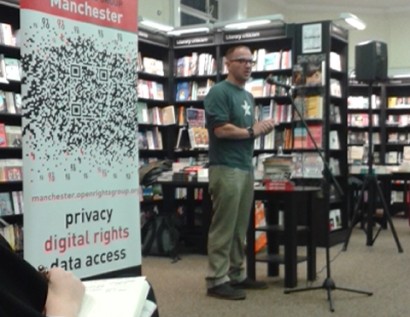 MLF Chapter & Verse
MLF Chapter & Verse
The Manchester Literature Festival Blog
Review: Cory Doctorow
Festival Blogger David Hartley reviews our Cory Doctorow event at Waterstones, a talk titled ‘Information doesn’t want to be Free.’
It’s no secret that the creative world is on a knife-edge thanks to the digital age. On the one side of the drop lies the enticing promise of fame, fortune and wild recognition, and on the other the confusing abyss of the internet and all who lurk in its underbelly – as well as those who try their hardest to rule as its overlords. Somewhere in the midst of all this there are a few guiding lights and one of the brightest and boldest is science-fiction author and digital activist Cory Doctorow.
Standing proud among the fiction stacks at the gigantic Waterstones on Deansgate, Doctorow presented a passionate speech on the perils and potentials of creativity in the age of Google and Amazon. Hosted in conjunction with the Open Rights Group, of whom Doctorow was a founder member, he outlined three key rules for evaluating digital business models for creative people. Which may sound dry and corporate, but was quite the opposite: I hung on every word, both serious and humorous and by the end I felt as if I’d joined some great rallying cry for creative justice.
Seek out Doctorow on YouTube (he would actively encourage you to obtain his words in any digital way possible), where you can find various variations of this excellent speech and a deeper examination of his three key rules. They are, in brief:
- Any time someone puts a lock on something and doesn’t give you the key, they are not doing so for your benefit.
- Fame will make you rich, but you won’t get rich if no-one has heard of you.
- Information doesn’t want to be free, people do.
In summary, the gigantic distributing gorillas who rule over the digital jungle seem to be working as hard as possible to rob creators of all rights and all powers of negotiation. Through a combination of DRM (Digital Rights Management – the lock with the hidden key) and various nonsensical and ineffectual copyright laws, the people who give out our masterpieces to the masses get to call all the shots. And yet, as Doctorow gallantly explained, it is possible to wrestle back this control by being digitally savvy and playing the internet game for your own gain – as many wildly successful self-published authors have proved.In a brilliant conclusion, Doctorow showed how the internet is, in its barest state, a copying service and, in its grandest, the central nervous system of our age. It is used for banal reasons, but Doctorow defended the banal. He says of cat videos and Facebook comments: they are life’s encoded ways of communicating meaning and, from these tiny moments, great art is built. But that can only happen with an internet that is free and fair.
It was a beguiling and persuasive talk from an engaging and exciting individual. And, with no sign of our digital connectivity slowing down or getting any less complex, Doctorow’s words will continue to resonate and invigorate for a long, long time.
_
David Hartley is a short story writer and performer based in Manchester. He is one fifth of the writing collective Flashtag and his stories have been described as ‘flipping weird, but in a good way.’
davidhartleywriter.blogspot.com / @DHartleyWriter
Image: David Hartley
